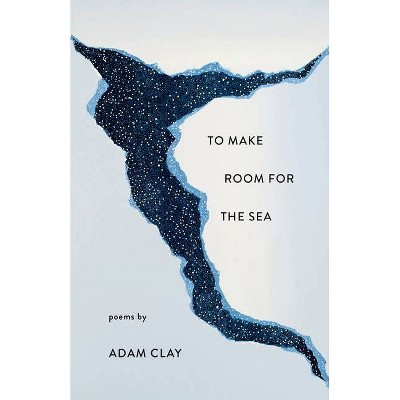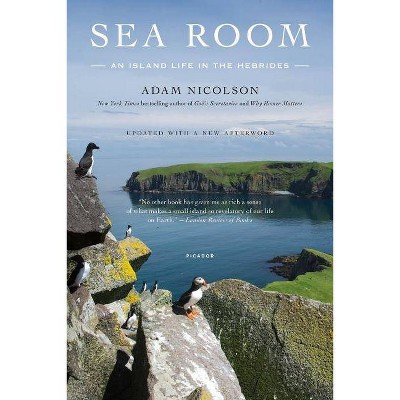To Make Room for the Sea - by Adam Clay (Paperback)

Similar Products
Products of same category from the store
AllProduct info
<p/><br></br><p><b> About the Book </b></p></br></br><b>"That's the magic of this book--the way Adam Clay, line after line, enacts the mind on the page." --MAGGIE SMITH</b><p/><br></br><p><b> Book Synopsis </b></p></br></br><p><b>"That's the magic of this book--the way Adam Clay, line after line, enacts the mind on the page." --MAGGIE SMITH</b></p> <p><i>To Make Room for the Sea</i> reckons with the notion that nothing in this world is permanent. Led by an introspective speaker, these poems examine a landscape that resists full focus, and conclude that "it's easier to love what we don't know."</p> <p>"I hold this leaf I think / you should see, but I can't quite / say why," Adam Clay writes, as he navigates a variety of both personal and ecological fixations: disembodied bullfrog croaks, the growth of his child, a computer's dreaded blue screen of death. The observations in <i>To Make Room for the Sea</i> convey both grief for the Anthropocene and hope for the future. The poems read like field notes from someone who knows the world and hopes to know it differently.</p> <p>On the precipice of great change and restructured perspective, Clay's poems linger in "the second between taking in a vision and processing it," in the moment when the world is less a familiar system and more a palette of colors and potential.</p> <p><i>To Make Room for the Sea</i> delights as much as it mourns. It looks forward as much as it reflects. Deft and hopeful, the poems in this collection gently encourage us to take another look at a world "only some strange god might have thought up / in a drunken stumble."</p><p/><br></br><p><b> Review Quotes </b></p></br></br><br>[An] accomplished, formally dexterous collection . . . discovering hope and fulfillment in the intricacies of human connection. <b>--<i>Publishers Weekly</i></b> <p/> There's a deep sense of elegy in the collection's tone. Utilizing a circular rhythm and logic that bends toward return--whether from sleep to wakefulness, or from abstraction to physicality--the poems evoke a complex wistfulness. --<i><b>Foreword Reviews</i></b> <p/> In their lyrical phrasings and human connection to the everyday, the poems in <i>To Make Room for the Sea</i> vividly paint images of the space between known and unknown, the space where hope first takes its hold. The result is a collection of meditative poems that never lose faith in the persistence of the human spirit. Experiencing the world painted by Adam Clay is to discover that most enduring of human traits: the will to survive. --<b>Southern Review of Books</b> <p/> This book stunned me. From the first poem to the last, I was astonished at Clay's grounded and lucid style. In this new collection, he grapples with the impermanence of both growth and decay and the quickly changing state of our planet. However, amidst the mourning, Clay manages to imbue his collection with hope and a yearning for the future. <b>--Brooks Mellen, Bookshop Santa Cruz</b> <p/> These poems trace the transience of experience and memory, the limits and necessity of language, all while balancing the weight of loneliness and loss with the inertia of hope and awe. Clay has a knack for deft phrasing, for exploring inner vastness, for crafting last lines that stay with you long after the poems end. <b>--Ben Groner, Parnassus Books</b> <p/> Whenever I read Adam Clay's poetry, I find myself slowing down and taking stock of the world around me and within myself. In his recent collection, <i>To Make Room for the Sea</i>, Clay deftly weaves together the vulnerable narrative with the ontological. He examines the situation, perhaps even the origins, of the inner life so that we can live more fully in the outer . . . It's a journey I certainly recommend. --<b><i>The Adroit Journal</b></i> <p/> Clay converts his powers of observation to a force of love. Because these poems pay such inquisitive and gentle attention to the rooms through which the writer moves, to the faces and phrases he happens upon, they illuminate what the novelist and essayist Marilynne Robinson calls the 'dear ordinary.' To find the ordinary dear--it is a more difficult task than one might guess. It is also, undoubtedly, a nudge toward kindness. <b>--<i>Tupelo Quarterly</i></b> <p/> The more I sit with these poems, the more they resonate with me and with universal patterns and themes--existential inquiries, loneliness, spiritual doubts. --<b><i>Green Mountains Review</b></i> <p/> "With its soaring phrasings, its exquisite collage of major and minor, and its potent imagery of the painter and the painted, Adam Clay's <i>To Make Room For the Sea</i> recalls Joni Mitchell at her most enduring. Time and chance reorganize our lives and selves; Clay's new collection responds with shock and smarts and tenderness and a continuous commitment to dwelling in the space of unknowing. From the hushed and simmering to the nearly operatic, these poems burn bright as the cardinal that 'looked / nuclear at a distance.' They refuse to turn away from the totalizing responsibility we have toward one another: how it undoes us, how it saves us, how it goes on."--<b>Natalie Shapero</b> <p/> "In Adam Clay's achingly beautiful new collection, <i>To Make Room for the Sea</i>, love is also and always a story that changes as inevitably as seasons. Within these meditative lyrics, silence never searches for an answer but a mind does, and each poem feels like 'a prayer for the oldest worlds within us.' Stretched between grief and praise, Clay studies trees, parenthood, the sky, the moments that make loneliness new. These poems remind me that no matter the losses we face, we hold on because, like blossoms, our survival depends on it."--<b>Traci Brimhall</b> <p/> "In a time of uncertainty and upheaval, both personal and collective, 'Life mostly feels like walking the line / between an elegy and an ode'--and the poems in <i>To Make Room for the Sea</i> walk that line, too, between searching and wise, melancholy and hopeful. Perhaps the most seductive part of the book is the questions the poems ask: 'What replaces the irreplaceable?' 'What can be taken back?' 'How willful must one / be to stop the body from enacting / the mind?' And that's the magic of this book--the way Adam Clay, line after line, enacts the mind on the page."--<b>Maggie Smith</b> <p/> <i>To Make Room for the Sea</i> is an exhibition of what the meditative poem is and what it can do. And Adam Clay wants us to know that one of the things it can indeed do is 'Marvel at what the body will do / To survive.' I am most taken by how many times this book risks making use of the word 'hope, ' and at how each poem that does so earns it every time. This is a beautiful book of persistence, of fatherhood, of romance, of heartbreak, of the American South and what its history can mean for those who leave it and return, and yes, this is a book about faith.--<b>Jericho Brown</b><br><p/><br></br><p><b> About the Author </b></p></br></br><b>Adam Clay</b> is the author of three collections of poems: <i>Stranger</i>, <i>A Hotel Lobby at the Edge of the World</i>, and <i>The Wash</i>. His poems have appeared in <i>Tin House</i>, <i>Ploughshares</i>, <i>Denver Quarterly</i>, <i>Georgia Review</i>, <i>Crazyhorse</i>, <i>Bennington Review</i>, and <i>jubilat</i>, and online at Poetry Daily and the Poem-a-Day project of the Academy of American Poets. He is editor of <i>Mississippi Review</i>, a coeditor of <i>Typo Magazine</i>, and a book review editor for <i>Kenyon Review</i>. He teaches in the Center for Writers at the University of Southern Mississippi.
Price History
Cheapest price in the interval: 11.79 on October 23, 2021
Most expensive price in the interval: 11.79 on November 8, 2021
Price Archive shows prices from various stores, lets you see history and find the cheapest. There is no actual sale on the website. For all support, inquiry and suggestion messages communication@pricearchive.us




















